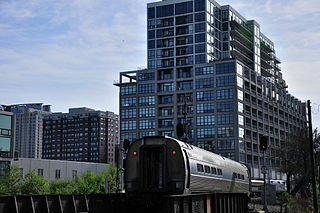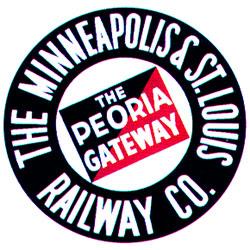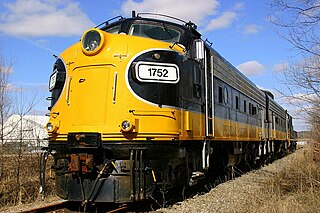
BNSF Railway is the largest freight railroad in the United States. One of six North American Class I railroads, BNSF has 36,000 employees, 33,400 miles (53,800 km) of track in 28 states, and over 8,000 locomotives. It has three transcontinental routes that provide rail connections between the western and eastern United States. BNSF trains traveled over 169 million miles in 2010, more than any other North American railroad.

The original Chicago, Rock Island and Pacific Railroad was an American Class I railroad. It was also known as the Rock Island Line, or, in its final years, The Rock.

The Chicago, Burlington and Quincy Railroad was a railroad that operated in the Midwestern United States. Commonly referred to as the Burlington Route, the Burlington, CB&Q, or as the Q, it operated extensive trackage in the states of Colorado, Illinois, Iowa, Missouri, Nebraska, Wisconsin, Wyoming, and also in Texas through subsidiaries Colorado and Southern Railway, Fort Worth and Denver Railway, and Burlington-Rock Island Railroad. Its primary connections included Chicago, Minneapolis–Saint Paul, St. Louis, Kansas City, and Denver. Because of this extensive trackage in the midwest and mountain states, the railroad used the advertising slogans "Everywhere West", "Way of the Zephyrs", and "The Way West".

The Iowa, Chicago and Eastern Railroad (IC&E) was a Class II railroad operating in the north central United States. It has been controlled by the Canadian Pacific Railway and operated as a part of its system since October 30, 2008. Formerly, the IC&E was jointly owned with the Dakota, Minnesota and Eastern Railroad by Cedar American Rail Holdings (CARH), making the combined system the largest class II railroad in the United States. Created by the purchase of I&M Rail Link, IC&E commenced operations on July 30, 2002. The 1,400-mile (2,300 km) line, based in Davenport, Iowa, serves the states of Illinois, Iowa, Missouri, Minnesota and Wisconsin. Principal commodities include chemicals, coal, steel, automobiles, and agricultural products. Train dispatching is performed at a joint DM&E/IC&E facility in Sioux Falls, South Dakota. On December 26, 2008, the IC&E was merged into parent CARH, which immediately merged into the DM&E.
The I&M Rail Link was a railroad operating in the north central portion of the United States. The company commenced operations on April 5, 1997, acquiring lines from the Canadian Pacific Railway and Soo Line Railroad.

The St. Charles Air Line is a rail line in Chicago, Illinois, partially owned by the BNSF Railway, Union Pacific Railroad (UP), and Canadian National Railway (CN).

The Minneapolis and St. Louis Railway (M&StL) was an American Class I railroad that built and operated lines radiating south and west from Minneapolis, Minnesota for 90 years from 1870 to 1960. The railway never reached St. Louis but its North Star Limited passenger train ran to that city via the Wabash Railroad.
The Fremont and Elkhorn Valley Railroad was a 17-mile (27 km) heritage railroad headquartered in Dodge County, Nebraska, which offered excursion services on the line. Its equipment is now owned by the Nebraska Railroad Museum.

The Burlington Bridge is a vertical-lift railroad bridge across the Mississippi River between Burlington, Iowa, and Gulfport, Illinois, United States. It is currently owned by BNSF Railway and carries two tracks which are part of BNSF's Chicago–Denver main line.

The Keokuk Junction Railway Co., is a Class III railroad in the U.S. states of Illinois and Iowa. It was formerly a subsidiary of Pioneer Railcorp, but now operates as a subsidiary of Patriot Rail Company.

The Government Bridge or Arsenal Bridge spans the Mississippi River, connecting Rock Island, Illinois and Davenport, Iowa. The Iowa Interstate Railroad uses the upper deck of the bridge for its ex-Chicago and Rock Island Railroad route between Council Bluffs, Iowa and Chicago, Illinois. The lower deck carries automobile traffic between the two cities. It is located near Upper Mississippi Mile Marker 483, adjacent to the Mississippi River Lock and Dam No. 15. The current structure is the fourth at this location. The bridges all were built with a swing section to accommodate traffic navigating the river.

The Terminal Railroad Association of St. Louis is a Class III switching and terminal railroad that handles traffic in the St. Louis metropolitan area. It is co-owned by five of the six Class I railroads that reach the city.

The St. Croix Valley Railroad is a Class III short line railroad that operates over 36 miles of track in eastern Minnesota. The railroad is owned by KBN Incorporated jointly between Independent Locomotive Service of Bethel MN and Midwest Locomotive Services of Atwater MN, with the railroad headquartered in Rush City, Minnesota.

The Kansas City Terminal Railway is a Class III terminal railroad that serves as a joint operation of the trunk railroads that serve the Kansas City metropolitan area, the United States' second largest rail hub after Chicago. It is operated by the Kaw River Railroad.
The Kankakee Belt Route is the nickname for the Illinois Division of the New York Central Railroad, which extended from South Bend, Indiana, through Kankakee, Illinois, and westward to Zearing, Illinois. This line was sometimes referred to as the "3 I Line", in reference to a corporate predecessor, the "Indiana, Illinois & Iowa Railroad". That portion of the line west of Kankakee to Moronts, Illinois, roughly parallels the Illinois River in Northern Illinois and was used, in large part, to transport corn toward eastern markets. See Kankakee Outwash Plain
The following is a brief history of the North American rail system, mainly through major changes to Class I railroads, the largest class by operating revenue.

Union Station, also known as Union Station and Burlington Freight House, is located along the riverfront in downtown Davenport, Iowa, United States. It is listed on the National Register of Historic Places. The buildings are in a section of downtown with several historic structures. Across Ripley Street to the west is the Chicago, Milwaukee, St. Paul and Pacific Freight House, and to the east across Harrison Street is the Dillon Memorial. On River Drive northwest from the Burlington Freight House is The Linograph Company Building. Across Beiderbecke Drive to the south are the W.D. Petersen Memorial Music Pavilion and the Mississippi River.
The Chillicothe Subdivision or "Chillicothe Sub" is a railway line running about 229 miles (369 km) from Chicago, Illinois to Fort Madison, Iowa in the United States of America. It is operated by BNSF Railway as part of their Southern Transcon route from Chicago to Los Angeles. The Chillicothe Subdivision is a high volume route connecting three principal yards in Chicago in the east and the Marceline Subdivision in the west which continues to Kansas City.














